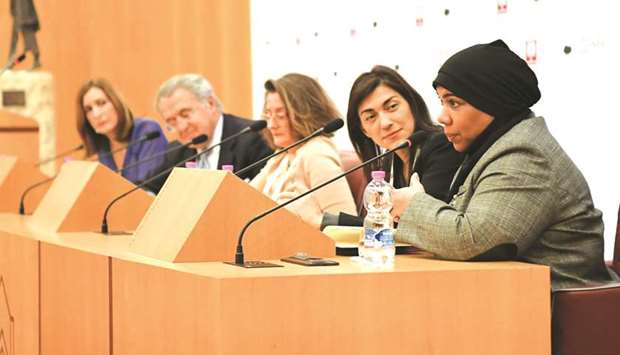A practical publication for healthcare workers that helps them better understand the needs of people of faith who are receiving palliative care is to be produced by the World Innovation Summit for Health (WISH).
At the closing of a two-day inter-faith symposium in Vatican City, titled ‘Religion and Medical Ethics: Palliative Care and the Mental Health of the Elderly’, Sultana Afdhal, chief executive officer, WISH, said the conference has led the Qatar Foundation initiative to make three commitments to improve the implementation of palliative care in Qatar.
“We will develop religion and medical ethics training sessions for healthcare workers that emphasise how spirituality needs to be considered as integral to holistic care,” she said.
“We will look at the individual sessions over the last two days and develop targeted workshops, including a workshop specifically on the topic of paediatric palliative care.
“Lastly, we will work together with the Pontifical Academy for Life to use our joint declaration from January, and the resulting positioning paper delivered to His Holiness Pope Francis in October 2019, to produce a practical publication for healthcare workers that helps them better understand the needs of people of faith receiving palliative care,” she added.
Addressing the symposium, Afdhal said it was crucial that conversations initiated during the two-day gathering now continue and are “stepped up”.
“It is vital that our talks lead to positive action that is patient-focused, that promotes the need to consider the faith of patients, and that helps healthcare workers to better deliver compassionate care,” she said.
In his closing address, Archbishop Vincenzo Paglia, president of the Vatican’s Pontifical Academy for Life, with whom WISH co-organised the symposium, said palliative care needs to be a mandatory part of medical training for all healthcare professionals, to ensure the continuation of care for the elderly.
“Palliative care was introduced relatively recently - a few decades ago - so few states have passed laws, and where laws have been passed, as in the case of Italy, they are not applied,” he said.
“People ignore them. There is a problem in terms of communicating this approach of accompanying people towards the end of their lives. Palliative care is only administered in the field of oncology today, and during this conference, we realised it’s open to the whole clinical spectrum.
“We need to consider it and try to understand how our movement can be effective in this sector. We have to promote the growth of a culture of palliative care in universities, and I would like this to be a mandatory subject in medical schools.”
The second day of the symposium featured a discussion on the effect of Alzheimer’s disease and others forms of dementia on an increasingly ageing population. During the session, titled Maintaining the Bridge of Love Between People with Demantia and their Carers, Dr Hanadi Khamis al-Hamad, medical director of Rumailah Hospital, and Qatar Rehabilitation Institute, said the Muslim faith encourages members of society to take care of their loved ones.
“Love, and taking care of a mother or a father or a loved one, is part of a strong religious conception as a Muslim; it is considered rewarding in Islam,” she told the symposium. “We have a positive responsibility towards our parents.”
What has traditionally been lacking, said Dr al-Hamad, is a lingering stigma and misconceptions about diseases that afflict an ageing population, most commonly Alzheimer’s disease and forms of dementia, explaining that people can hide a family members’ dementia or mistakenly believe it is a natural part of the ageing process.
Dr al-Hamad now helps up to 40 awareness programmes in communities across Qatar to break down such barriers and said she has now seen an upsurge of patients seeking help for age-related illnesses in Qatar.
Addressing the mental health of the elderly from an Islamic perspective during the symposium, Dr Ayman Shabana, associate research professor at QF partner university Georgetown University in Qatar, said ageing is a “pressing worldwide issue”, with the World Health Organisation estimating that, between 2015 and 2050, the percentage of over-60s among the world’s population will rise from 12% to 22% - but negative stereotypes about the elderly persist.
He emphasised the need for every elderly member of society to have “integration within the family and larger social fabric”, saying: “They should never be isolated or left to suffer loneliness or other problems.
“In our religion, the elderly are seen as the ones that have already contributed in life; and now it is their turn to enjoy the fruits of their hard work. Serving the needs of these people can serve as a practical testimony to our faith commitments.”

Speakers at the two-day inter-faith symposium.
